Contents
It often happens that the pressure in hypotensive patients drops so much that it is difficult for them to even move around. As a rule, in such cases, it is advised to drink coffee or eat chocolate, but this is all limited. And then such patients themselves begin to look for drugs that increase blood pressure.
We provide a large list of drugs that increase blood pressure, but please note that before drinking this or that medicine, you should definitely consult a doctor, familiarize yourself with contraindications and side effects.
Dopamine-Ferein
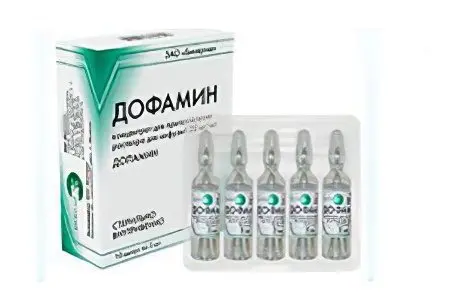
Analogues: Dopmin, Dopamine.
Pharmachologic effect: affects dopaminergic receptors, increases the tone of the peripheral circulatory system. This results in an increase in blood pressure. The effect of the drug on the kidneys – increases blood flow in this organ, reduces the resistance of the kidney vessels, increases renal filtration.
Indications:
Hypovolemic shock;
Cardiogenic, endotoxic, traumatic, postoperative shock conditions;
Improvement of hemodynamics in acute cardiovascular insufficiency.
The choice of Dopamine is more indicated than the use of Norepinephrine and other catecholamines, since the drug increases the blood supply to the kidneys and other internal organs, and has less effect on the resistance of the vessels of the peripheral circulatory system.
Dosage and method of application: Dopamine dosage is selected for each patient individually, depending on hemodynamics and cardiogram readings. Method of administration – intravenous drip. Dopamine is diluted in isotonic sodium chloride solution or in 5% glucose solution. Proportions – 200 mg of the drug per 400 ml of solution or 25 ml of the drug in 125 ml of solution.
Doses:
Initial – 1-5 mcg / kg per minute;
Usual – 10-25 mcg / kg per minute;
The daily dose is from 400 to 800 mcg.
Conducting continuous infusion lasts from several hours to 1-4 days. The effectiveness of Dopamine manifests itself immediately after the start of administration, the action stops 5-10 minutes after the end of the infusion.
Contraindications:
Pheochromocytoma of the adrenal glands;
The use of monoamine oxidase inhibitors for arrhythmias;
Application for anesthesia Ftorotana, Trichlorethylene.
Product form:
Dopamine release form – ampoules for injection with a volume of 5 ml with 0,5% and 4% solution (contain, respectively, 25 and 200 mg of the active substance).
Cordiamin
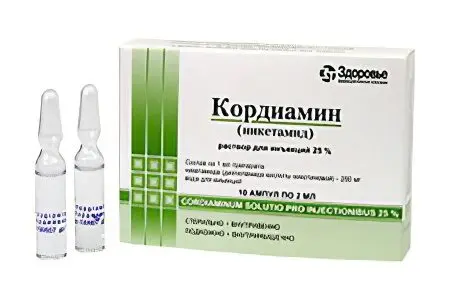
Analogues: Niketamide.
Pharmachologic effect: stimulation of the central nervous system, excitation of the vasomotor and respiratory centers.
Indications:
Collapse (significant sudden drop in blood pressure);
Asphyxia in a state of shock;
Asphyxia in newborns;
Acute and chronic circulatory disorders;
Poisoning with narcotic painkillers, sleeping pills from the group of barbiturates.
Dosage and method of application:
Injections in / in or / m, 1-2 ml 1-3 r / day;
Children subcutaneously at 0,1-0,75 depending on body weight and age;
In case of poisoning with drugs, painkillers, barbiturates – slowly in / in from 3 to 5 ml
The highest single dose – 2 ml;
The highest daily dose – 6 ml
Contraindications and side effects:
Hyperthermia in children;
Epilepsy or tonic-clonic convulsions in history;
Allergy to Niketamide.
Product form:
The release form of the drug is ampoules (1 ml and 2 ml), vials (15 ml).
Mesatone
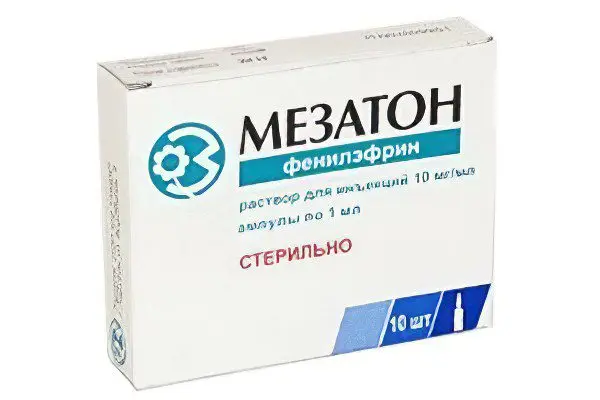
Analogues: Adrianol, Irifrin, Adrianol.
Pharmachologic effect: stimulation of alpha adrenergic receptors of the heart. Beta receptors are not sensitive to the drug, it is an adrenomimetic agent, it has a vasoconstrictor effect.
Indications:
Reduced blood pressure (arterial hypotension);
Toxic, traumatic shock, other cases of shock;
Vascular insufficiency.
Dosage and method of application:
With collapse, intravenous drip – 1 ml of 1% solution is diluted in 250-500 ml of dextrose (5%).
With arterial hypotension, subcutaneous or intramuscular administration – in adults up to 1 ml of 1% solution 2-3 r / day, in adolescents from 15 years old 0,5-1 mg / kg of body weight.
Contraindications and side effects:
Hypertrophy and ventricular fibrillation;
Pheochromocytoma of the adrenal glands;
Atherosclerosis;
Hyperthyroidism, advanced age, tendency to angiospasms – use with caution.
Side effects:
Nausea,
Headache,
Ventricular fibrillation,
Heart rhythm disturbances
Cardiopalmus,
convulsions,
Pale skin,
Limb tremor.
Product form:
Form release of the drug Mezaton: 1% injection ampoules, 1 ml, package No. 10, powder.
Norepinephrine
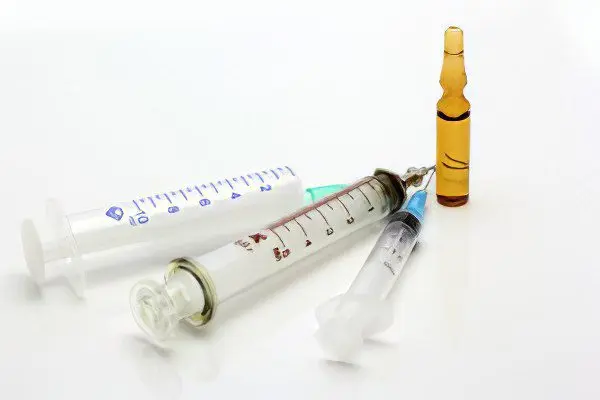
Analogy: Norepinephrine.
Pharmachologic effect: stimulates alpha adrenergic receptors. Unlike Adrenaline, the drug stimulates myocardial contractions less, has a more pronounced contracting effect on blood vessels, and is a weak bronchodilator (expands the lumen of bronchioles). The drug belongs to the clinical and pharmacological group of alpha and beta adrenomimetics.
Indications for the use of Norepinephrine – rapid recovery of blood pressure with its sharp drop as a result of:
Injury or surgery;
Cardiogenic shock;
Internal profuse bleeding;
Poisoning with sleeping pills, drugs, drugs;
Overdose of antihypertensive drugs.
Dosage and method of application:
Introduction in / in the drip method – dilute 40 ml of Norepinephrine in 460 ml of dextrose 5%;
Introduction using a syringe infusion pump – dilute 4 ml of the drug in 46 ml of dextrose 5%.
The initial rate of administration is 0,1-0,3 µg/kg/min. Mandatory control of blood pressure.
Contraindications and overdose:
Anesthesia with the use of Cyclopropane, Fluorotan, Halothane, Chloroform (risk of arrhythmia);
Hypoxia;
Hypercapnia;
Hypotension caused by hypovolemic shock (with reduced blood volume).
With caution, the drug is used for atherosclerosis, vascular thrombosis, left ventricular failure, a history of myocardial infarction.
Side effects of the drug:
Tissue necrosis when it gets under the skin (the consequences are stopped by the introduction of 5-10 mg of Phentolamine mixed with 10 ml of physiological solution);
Arrhythmias, heart failure with too rapid administration;
Dyspnea;
Pain in the sternum;
Anorexia;
respiratory failure;
Headache;
Photophobia.
Product form:
Release form of the drug: ampoules for injections 1 ml 0,2% solution No. 6.
Storage conditions: the drug belongs to list B, store without access to light.
Ephedrine hydrochloride
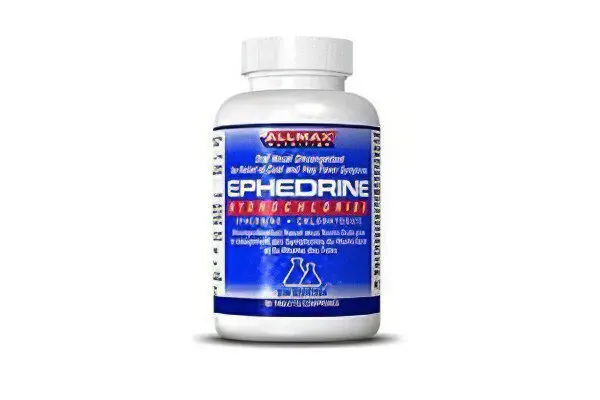
Analogs: Teofedrin-N.
Pharmachologic effect: stimulates alpha and beta adrenoceptors. The effect of the drug is weaker than that of Adrenaline, but longer. The drug narrows dilated vessels, while reducing their increased permeability.
Indications for the use of Ephedrine – arterial hypotension caused by the following reasons:
Collapse,
state of shock
Blood loss due to trauma, surgery,
Overdose of drugs that reduce pressure, adrenoblockers,
Poisoning with barbiturates, drugs.
Dosage and method of application:
Injections in / in a jet, slowly – from 0,5 to 1 ml of 5% solution;
Drip administration – dissolve 2 ml of 5% solution in 0,5 l of isotonic nacl solution or glucose solution;
Injections in / m, subcutaneous – 0,02-0,05 g 2-3 r / day.
Contraindications and side effects:
Increased thyroid function (hyperthyroidism);
Sleep and heart rhythm disturbances;
Arterial hypertension, accompanied by a persistent increase in blood pressure;
Atherosclerosis;
Pheochromocytoma;
Ventricular fibrillation.
Side effects:
Tremor of the limbs;
Insomnia;
Dizziness and hallucinations;
Muscle spasm and convulsions;
Angina;
Tachycardia;
Bradycardia;
Appetite disorders;
Difficulty urinating.
Product form:
Ephedrine release form: tablets of 0,025 g, 1 ml injection ampoules with 5% solution No. 10, powder.
Aralia tincture
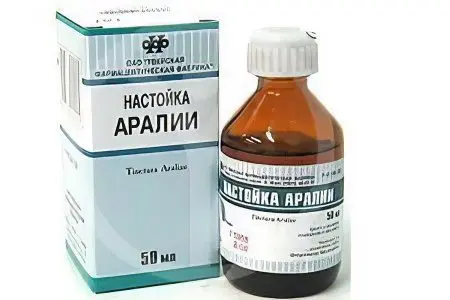
Alcohol extract from the roots of the Manchurian aralia (Aralia Mandshurica Rupp. et Maxim). Analogue: saparal.
Pharmachologic effect: regulates blood pressure, lowers blood sugar, tones the central nervous system. Aralia tincture has a pronounced anti-inflammatory, antitoxic, diuretic effect, it improves the functionality of the myocardium, helps relieve stress.
Indications:
arterial hypotension;
Muscular asthenia;
Impotence on the background of neurosis;
Depression after traumatic brain injury with asthenic syndrome;
Frequent mood swings.
Dosage and method of application: from 30 to 40 drops 2-3 r / day.
Contraindications:
Arterial hypertension;
sleep disorders;
Increased excitability.
Insomnia can be a side effect after taking the tincture if taken in the evening.
Product form:
Release form of the drug: 70% alcohol tincture in dark glass bottles with a volume of 50 ml
Storage conditions: the medicine is included in list B, it should be stored in a cool place, protected from light.
Ginseng tincture
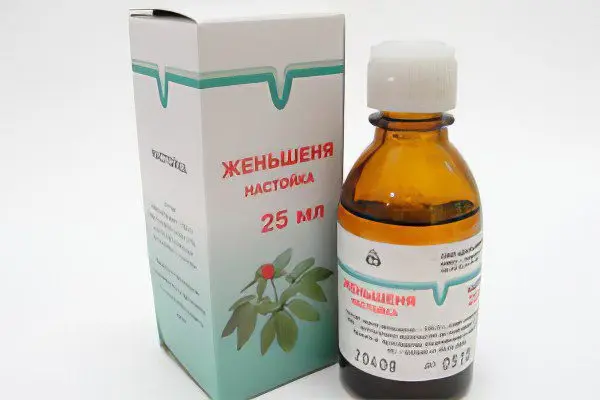
Alcoholic extract from ginseng root (cultivated and wild) perennial (Panaxginseng), five-leafed (Panaxginseng), and creeping (Panaxginseng).
Pharmachologic effect:
CNS toning;
Prevention and treatment of hypotension;
Increasing efficiency;
Prevention of drowsiness and fatigue;
Decreased blood sugar (hypoglycemic effect);
Activation of the adrenal cortex.
Indications:
arterial hypotension;
Increased fatigue and tiredness;
Asthenia;
Neurasthenia;
Rehabilitation after past infections;
Therapy of exhaustion of sexual function.
Dosage and method of application: 15-25 drops 2-3 r / day. Apply for 30-40 days, repeat the course if necessary after 2-3 weeks.
It is undesirable to take the drug in the afternoon. The action of the tincture is especially effective in autumn and winter.
Contraindications:
Increased blood pressure;
Pregnancy, lactation;
Tendency to convulsions;
Epilepsy;
Increased excitability;
Children’s age up to 12 years;
Hepatitis and hepatosis;
Diseases of the brain.
Product form: 70% alcohol tincture packaged in 50 ml dark glass bottles
Storage conditions: at a temperature of 8 to 15C, protected from light and out of the reach of children.
Zamanihi tincture
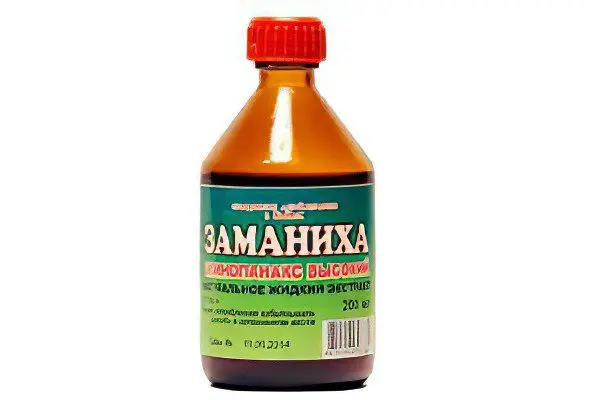
Echinopanaxelatum root tincture.
Pharmachologic effect: a drug that tones the central nervous system, a biogenic stimulant.
Indications:
Asthenia,
arterial hypotension;
Mental and physical overwork;
Depressive states.
Dosage and method of application: 30-40 drops dissolved in 1/3 cup of water, 2-3 r / day half an hour before meals.
Contraindications and side effects:
Atherosclerosis;
Arterial hypertension,
Increased nervous excitability;
Alcoholism;
Sleep disturbances.
With prolonged use, irritability, increased excitability may occur.
Product form: 50 ml bottles
Camphor
Pharmachologic effect:
Increased tone of the central nervous system;
Stimulation of respiration and blood circulation;
Analeptic effect (increased blood pressure);
Increased myocardial contractility;
Increased myocardial metabolism;
Stimulation of the respiratory center of the medulla oblongata;
vasoconstrictor action.
Indications:
arterial hypotension;
Collapse (a sharp drop in blood pressure);
Respiratory center depression;
Poisoning with sleeping pills and painkillers;
Prostration;
Rare pulse with toxicoinfection.
Dosage and method of application: injections under the skin of a 20% oil solution of the drug:
Children up to a year – 0,5-1 ml / day;
Children under 6 years old – 1-1,5 ml / day;
Children under 14 years old – 1,5-2,5 ml / day;
Adults – 2,5-5 ml / day.
Contraindications and side effects:
aortic aneurysm;
Inflammatory processes in the internal cavity of the heart (endocarditis);
Epilepsy;
Pregnancy;
Breast-feeding;
Increased nervous excitability.
Side effects from the use of camphor can be oil embolism (oil entering the blood vessel), allergic urticaria, a rash like scarlet fever, and nervous excitement.
Release form: injection ampoules with 20% oily solution, 1 ml and 2 ml, No. 10.
Storage conditions: at a temperature from 8 to 15C.
Caffeine
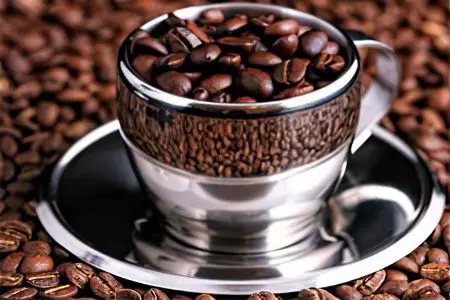
Pharmachologic effect: stimulation of the central nervous system, the drug is a cardiotonic, psychostimulant, analeptic (increases blood pressure).
Indications:
arterial hypotension;
Cardiovascular insufficiency;
Reduced mental and physical performance;
Overdose of opioid analgesics;
Inhibition of nervous activity, drowsiness;
Spasms of cerebral vessels.
Dosage and overdose:
Children – subcutaneous injections of 25-100 mg 3 r / day;
Adults – subcutaneous injections of 100-200 mg 3 r / day.
Contraindications and side effects:
Arterial hypertension;
Atherosclerosis;
Elderly age;
Glaucoma;
Increased nervous excitability;
Insomnia.
Side effects:
Caffeinism (addictive and addictive);
Anxiety;
Increased blood pressure;
Tachycardia;
Arrhythmia;
Nausea and vomiting.
Product form:
Solution for injection in 1 ml ampoules, No. 10;
Tablets for oral administration, 6 or 10 pcs. packaged.
Pantocrine
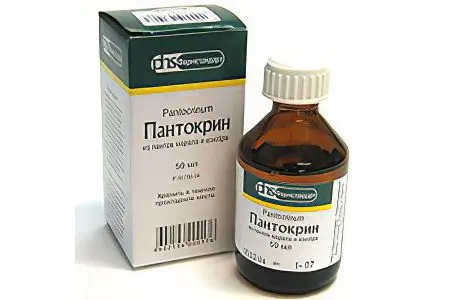
Alcoholic extract from unossified deer antlers, sika deer, deer.
Pharmachologic effect: stimulation of the central nervous system and cardiovascular system, increased intestinal activity, skeletal muscle tone, adaptogenic effect, increased efficiency, normalization of blood pressure.
Indications:
arterial hypotension;
Asthenia after infectious diseases;
Neurosis, overwork, neurasthenia;
Increased mental and physical stress.
Dosage and method of application:
Orally – 1-2 tablets 2-3 r / day half an hour before meals or drops of 30-40 drops;
Subcutaneous injections – 1-2 ml / day.
The course of treatment with the drug lasts 14-21 days, the repetition is carried out according to the doctor’s prescription after a 10-day break.
Contraindications and side effects:
Children’s age up to 12 years;
Atherosclerosis;
Hypertension;
Diarrhea;
Increased excitability;
lactation, pregnancy;
Oncological diseases in history;
Jades;
Angina;
Increased blood clotting.
Side effects from the use of Pantocrine are manifested by headache, increased blood pressure, insomnia, and the appearance of allergic reactions.
Forms of release:
Tablets of 0,15 g No. 150;
Ampoules for injections 1 ml No. 10;
Bottles 50 ml
Ekdisten
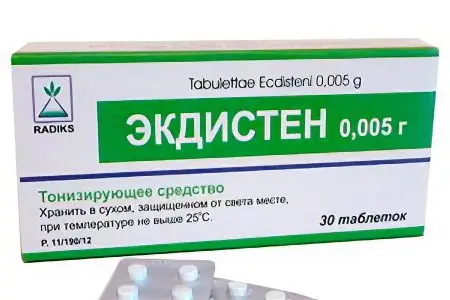
Natural compound of the steroid structure from the roots and rhizomes of the safflower leuzea.
Pharmachologic effect:
Pharmachologic effect:
Increased efficiency, physical activity;
Stimulation of the central nervous system;
Increased protein synthesis;
Weakening the effect of sleeping pills;
Strengthening memory, increasing its volume, accelerating the process of memorizing information.
Possessing the properties of synthetic anabolic steroids, Ekdisten has no effect on the adrenal cortex and thymus, and does not show an androgenic effect.
Indications:
Indications for the use of Ekdisten:
arterial hypotension;
Asthenia;
Depression;
neuroses and neurasthenia;
Prolonged intoxication of the body;
Support for the heart muscle during intense workouts;
Improving speed-strength qualities in preparation for sports competitions.
Dosage and method of application:
Dosage of Ekdisten:
Orally before meals, 5-10 mg 3 r / day for half an hour before meals;
In sports medicine – 10-20 mg 3 r / day.
The course of treatment is designed for 15-20 days, it can be repeated after a 1-2 week break. The highest dose for an adult is 25 mg once, 100 mg during the day. To obtain the full effect of taking the drug, the course is accompanied by the introduction of a complete set of vitamins, minerals, fats, proteins, carbohydrates into the diet.
Contraindications and side effects:
Contraindications to the use of Ecdisten:
Severe hypertension;
Hyperkinesis;
Epilepsy;
Nervous excitement;
Sleep disturbances.
Side effects:
Increased blood pressure;
Insomnia.
These manifestations are possible in patients with an unstable nervous system. In such cases, reduce the dose or cancel the drug.
Release form of the drug: tablets 5 mg.
Storage conditions: list B, store in a dry place without light.









